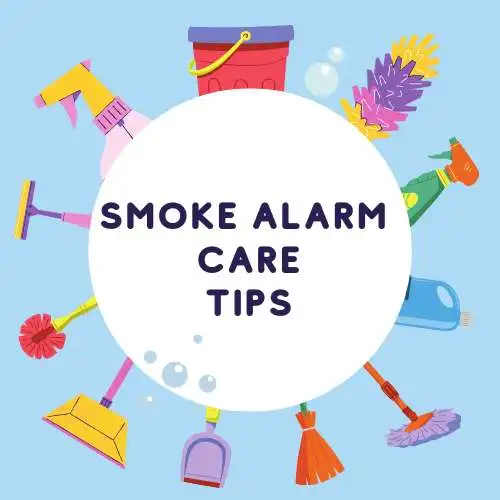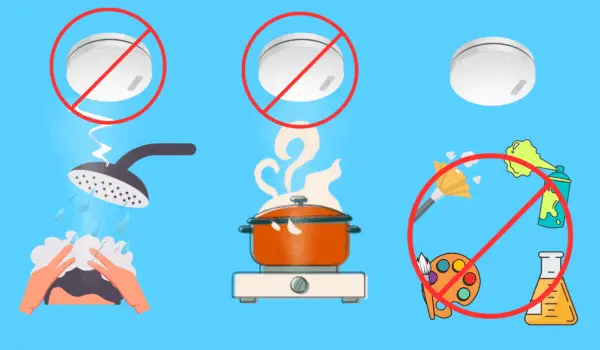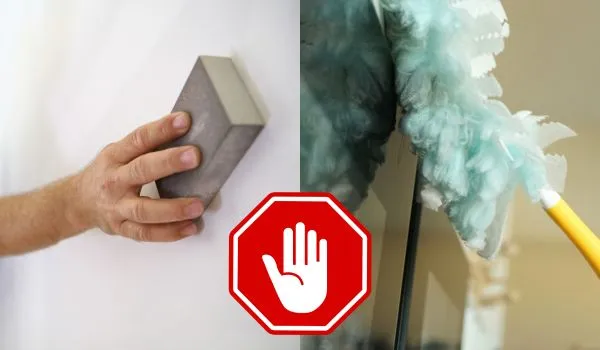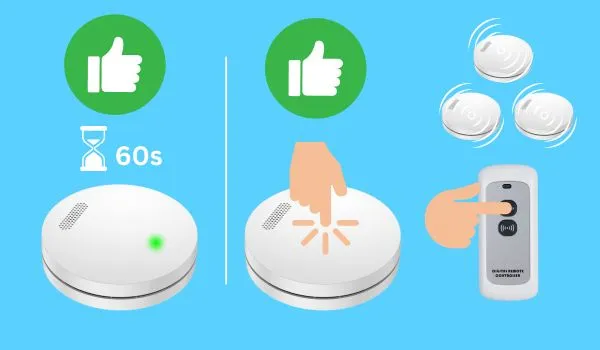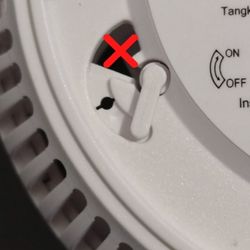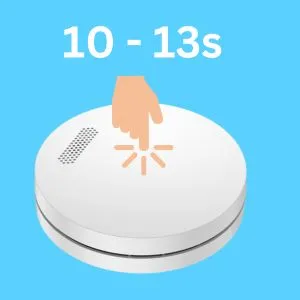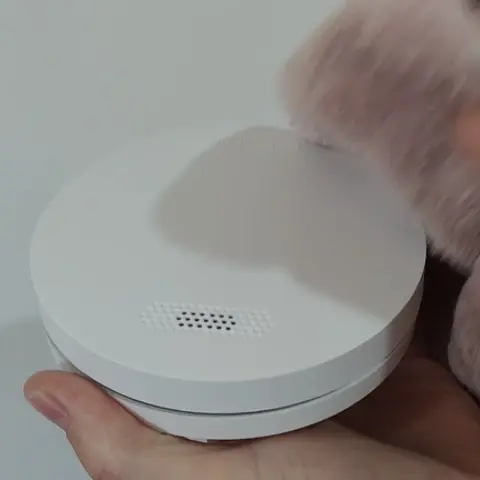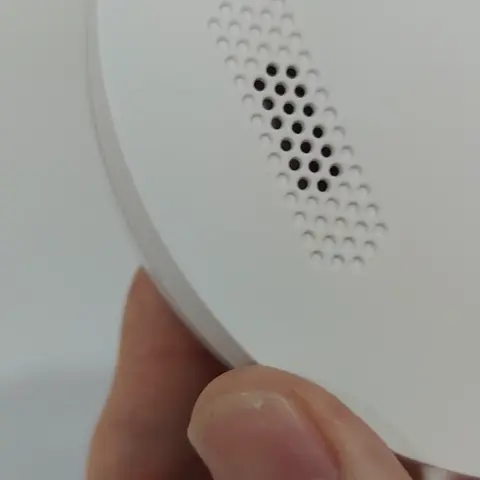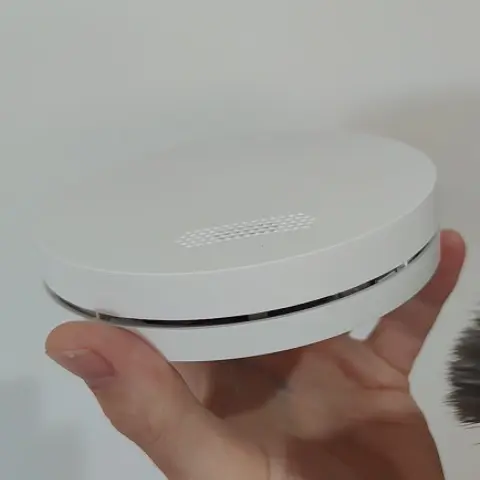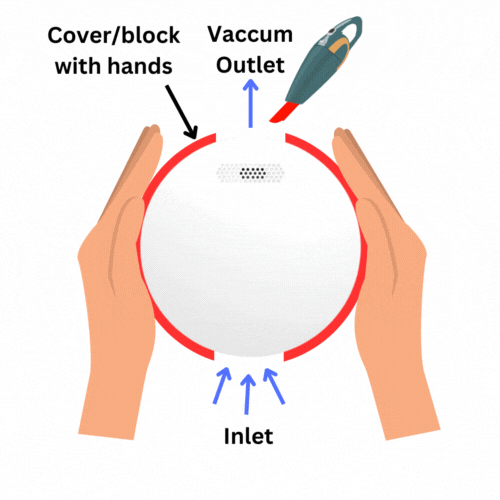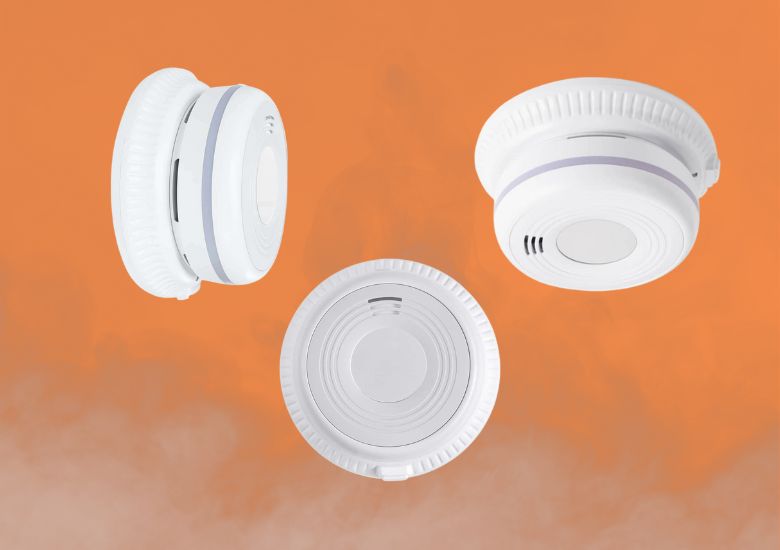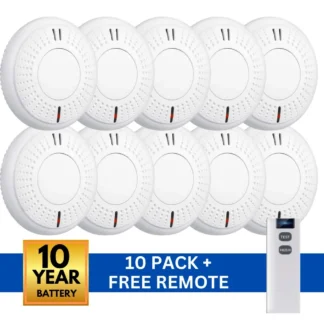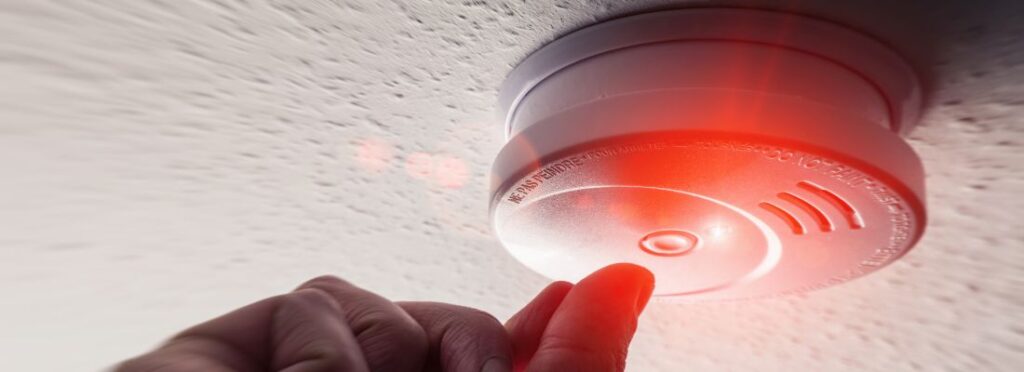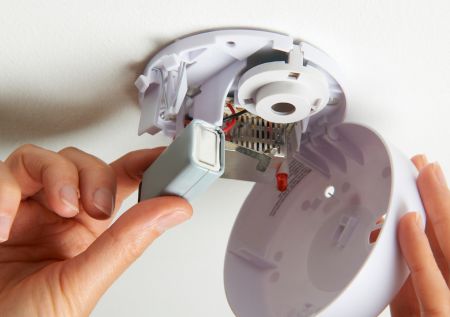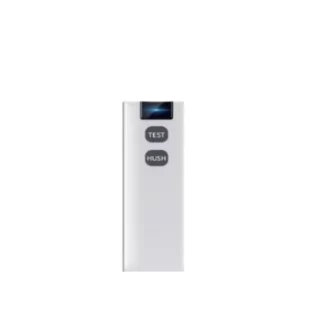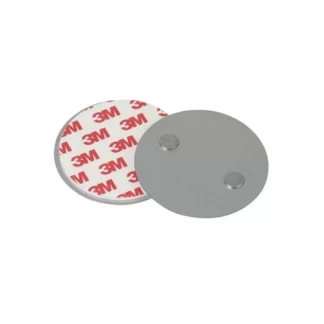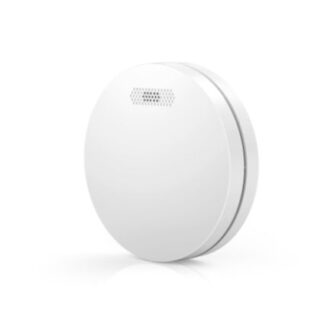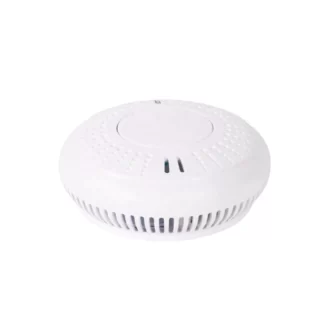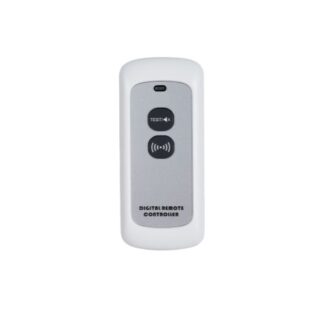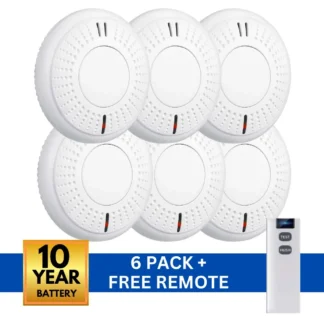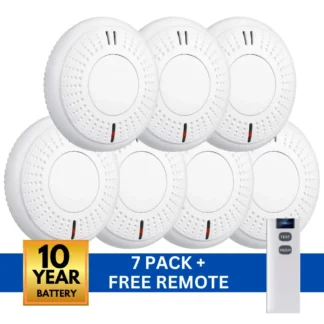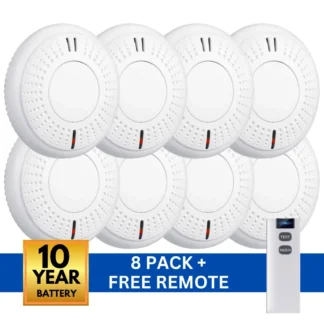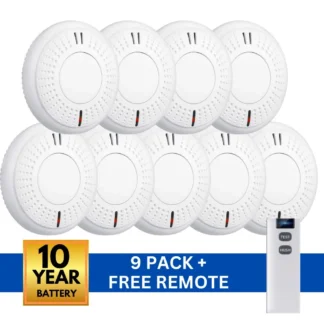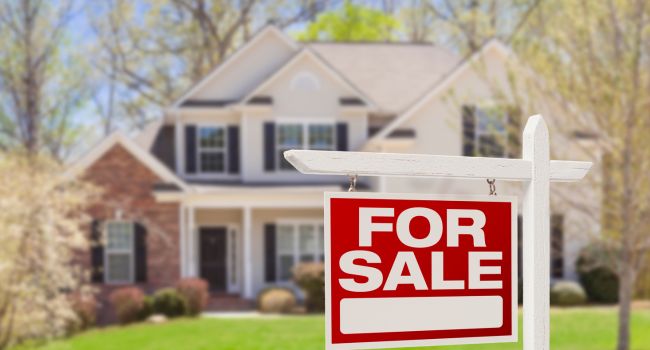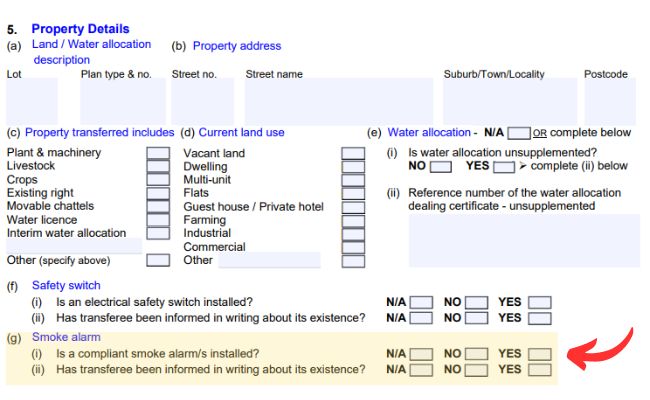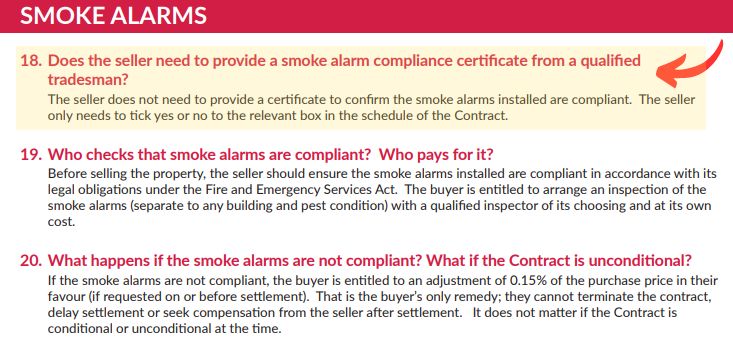Every home and building today should prioritise fire safety, and smoke detectors stand at the forefront of this mission. Two main categories dominate the market when looking at compliant smoke alarms for Australia: Hard Wired Smoke Alarms and their 10-year lithium battery operated counterparts.
Each brings its pros and cons. We will focus on Hard Wired Smoke Alarms today and answer some of the most commonly asked questions and hopefully help you decide what you require, and what fits in with your budget.
Do hard wired smoke alarms need to be replaced?
Yes, Hard Wired Smoke Alarms must be replaced every 10 years, calculated from the manufacturing date noted on the back of the alarm. Therefore, when investing in Hard Wired Smoke Alarms, it’s crucial to opt for those with the most recent manufacturing dates to ensure a full decade of efficient and compliant operation.
In the debate between 10-year battery-operated alarms vs 240v Hard Wired Smoke Alarms, many mistakenly believe that hardwired versions need less frequent replacement. In fact, you will need to consider if you will still be able to use the same base plate (if applicable), or have an electrician replace the hard wired smoke alarm and/or base plate each time.
Other reasons to consider updating your Hard Wired Smoke Alarms include test failures, internal backup battery low, internal dust or insect build-up, and potential damage from falls or bumps.
Do hard wired smoke alarms still have batteries?
Absolutely, Hard Wired Smoke Alarms are primarily connected to your main power supply, but they also have a 10-year lifespan lithium battery or a replaceable 9-volt as a backup. In some smoke alarms, the internal battery receives its charge from the main power, and others rely on the 10-year life span of the battery, this ensures the alarm remains active even during power outages.
The hard wired smoke alarms that have a 9-volt backup battery will need to be replaced every year, or when the smoke alarm indicates that it needs replacing, this is usually a specific type of beep or light flickering pattern.
Before purchasing a Hard Wired Smoke Alarm, it’s advisable to review the product details to understand the specifics of battery replacement requirements to ensure they will meet your needs.
Some smoke alarms solely rely on batteries, and these are designed with a non-removable lithium battery that powers the smoke alarm for 10 years. If eligible, is a much more affordable option.
Are hard wired smoke alarms better?
Hard Wired Smoke Alarms harness the power of 240V mains electricity and come with a supplementary 9V or 10-year lithium battery backup.
This dual power source ensures reliability, particularly during power disruptions, giving them an edge over solely battery-operated alarms. However, it’s essential to note that the 9V battery in these Hard Wired Smoke Alarms (If using this option) should be replaced annually.
Keep in mind when comparing your options of Hard Wired vs 10 Year Lithium Battery alarms that power outages are not a consideration when looking at battery power.
Why does my hard wired smoke alarm keep beeping?
When it comes to Hard Wired Smoke Alarms, a recurring beeping sound often leaves homeowners annoyed and confused.
A common reason for the beeping is a low internal backup battery level, sometimes after an event of a mains power outage. It may be equipped with a 9-volt replaceable battery or a sealed 10-year lithium battery.
For the smoke detectors with a 9-volt battery, a battery replacement will be sufficient. However, if your Hard Wired Smoke Alarm uses a non-removable lithium battery, the entire detector would need a replacement. It’s critical for safety reasons that homeowners address the beeping issues early.
Although we have just mentioned the most common cause, it’s always good to go back to the operating manual and confirm the reason the alarm is beeping. All smoke alarm manuals have a troubleshooting guide available. In the unlikely case it’s not, you can contact the manufacturer or supplier directly. The contact information is usually on the back of the smoke alarm, or a quick Google of the brand will get the information you need.
What are the pros and cons of hard wired smoke alarms?
For the purpose of this blog in relation to QLD smoke alarm laws, we’ll delve into a comparison between two choices: Mains Hard Wired Smoke Alarms (240v) and 10-Year Lithium Battery Smoke Alarms, focusing on those compliant with QLD regulations.
Hard Wired Smoke Alarms (Mains 240v):
Pros:
- A dual power source ensures reliability.
- Offers a backup power source, adding an extra layer of security.
- Primarily operates on consistent mains 240v power.
- Optional connectivity – Interconnection via WIFI modules or via a coms wire
Cons:
- Installation demands a qualified electrician, which can add to the costs.
- Hard Wired Smoke Alarms come with a higher price tag per alarm.
- In older properties, once fitted with a hard wired smoke alarm, the location within the house can no longer use a battery-powered smoke alarm.
- Despite being mains-powered, an internal battery replacement is occasionally necessary depending on the model.
- Technical issues need to be investigated on-site. Call-out fees range from $150 to $250 and are not refundable if there is no manufacturer fault found on the alarm. Possibly subject to call-out fee and alarm replacement.
10-Year Lithium Battery Smoke Alarms:
Pros:
- Installation is user-friendly with DIY options, saving on installation costs.
- Maintenance and replacement do not require trade qualifications, making the process straightforward.
- They are more affordable, making them a cost-effective choice for many households.
- In the event of a fault, replacement is easy and affordable. For example, You could purchase 5 smoke alarms for the cost of a 240v smoke alarm call-out fee.
Cons:
- Not suitable for all households in Queensland due to specific regulations.
- Absence of a backup power source.
Making an informed decision is key to ensuring your home’s safety. Remember, no matter the type of alarm, regular maintenance, and checks are crucial to keep them functioning safely.
How many years does a hard wired smoke detector last?
Hard Wired Smoke Detectors, like other smoke alarms, have a lifespan to ensure their effectiveness and safety. All Smoke Alarms are designed to be replaced after 10 years.
This duration starts from the manufacturing date, which can be found on the back of the unit. When purchasing Hard Wired Smoke Alarms, it’s essential to check this date. Lower-priced alarms may be old stock and several years old. We recommend asking the retailer for the manufacture date of the alarm you are purchasing.
Choosing a recently manufactured alarm ensures that you can rely on its efficiency and compliance for a full decade. Regular maintenance and checks are still crucial throughout these 10 years to guarantee optimal operation.
Why does my hard wired smoke alarm go off at night in Australia?
This concern is common among homeowners, and it’s essential to understand that it isn’t exclusive to Hard Wired Smoke Alarms; it applies to all types of smoke alarms. The primary culprits behind such late-night false alarms usually boil down to two factors: a decrease in room temperature and environmental triggers like high humidity, steam, or even tiny smoke particles in the atmosphere.
Steam and humidity from evening activities like showering can be the culprit, especially if a smoke alarm is placed near a bathroom. The moisture in the air from a hot shower can easily trigger an alarm. Given that many Australians take showers at night, this could explain the frequent nighttime false alarms.
Cooking is another potential reason. Installing Smoke Alarms near cooking appliances might not be ideal. Evening meals mean that stoves and ovens are often in use, releasing smoke particles that could activate an alarm.
A small guide to prevent and help troubleshoot Smoke Alarms from going off at night:
- Regularly test the smoke detectors and replace them as needed.
- Ensure that all your alarms are up to date, replacing them every ten years. Choose Smoke Alarms that are compliant with current legislative requirements and have been tested to comply with AS 3786:2014.
- Correct placement is vital. Keep Smoke Alarms away from areas prone to steam, humidity, or smoke.
- Always stay informed about the latest compliance standards and ensure your home meets all legislative requirements.
How do you replace the battery in a Hard Wired Smoke Alarm?
The process largely depends on the type of backup battery your alarm uses. For Hard Wired Smoke Alarms equipped with a 10-year lithium battery, the entire unit will likely need replacing since these batteries are typically non-removable.
However, if your alarm uses a 9-volt battery as a backup, you should exercise caution. Given that Hard Wired Smoke Alarms operate on 240v mains power, it’s essential to refer to the specific user manual for your smoke alarm model to ensure the process is completed correctly.
Each model might have slightly different battery replacement steps. Alternatively, we highly recommend contacting a local electrician to handle the replacement for you.
How do you turn off a hard wired smoke alarm?
The process can vary based on the specific model of your Hard Wired Alarm. Given your dealing with 240v mains powered alarms, always reference the manufacturer’s manual for guidance.
Some Hard Wired Smoke Alarms come equipped with an on-off switch that can be used for deactivation. If you are aiming to silence or disable an alarm that’s malfunctioning, it might be possible to detach the alarm from its mounting plate and remove the internal battery if the backup is a 9v power source.
However, always proceed with caution and consult the provided instructions for your specific Hard Wired Smoke Alarm model
Do I need to install hard wired smoke alarms?
Deciding on the type of smoke alarm you need to install on your property depends on several factors.
The below list is relevant to Queensland, it’s recommended to check your State Fire Service website or government rules and guidelines to understand the requirements.
- If you’re replacing pre-existing 240v mains connected hard wired smoke alarms, it must be replaced with a hard wired smoke alarm.
- Any new construction mandates the installation of hard wired smoke alarms, a regulation in place since 1997.
- For major renovations, hard wired smoke alarms are required; consult with your draftsman for specifics.
Although there are a lot of houses built that require hard wired smoke alarms, there are just as many that have the option to use lithium battery powered smoke alarms.
As a general guideline, and considering the above criteria are not met. If your property doesn’t currently have hard wired smoke alarms installed, you can use wireless smoke alarms that are powered by a 10-year life lithium battery.
If there are some existing hard wired smoke detectors, a combination of both hard wired and wireless can be installed to meet compliance while offering a more affordable DIY approach.
Conclusion
It’s evident that while hard wired alarms offer reliability through dual power sources, they come with an added financial burden due to installation costs and the need for qualified electricians.
On the flip side, the 10-year lithium battery alarms emerge as a compelling alternative, especially when one’s home is eligible for their use. We currently offer a slimline and value range photoelectric smoke alarm in our online store. Both meet compliance standards while offering a Do It Yourself affordable option.
They provide a balance of longevity, affordability, and maintenance without the strings of additional expenses. Ultimately, when considering both safety and budget, the 10-year lithium battery alarms stand out as a worthy choice for many homeowners.
I hope we have been able to answer some of the questions you have had ensuring you can make an informed decision and prioritise both safety and savings.
If you have any additional queries or questions, please feel free to contact us via our website form.
